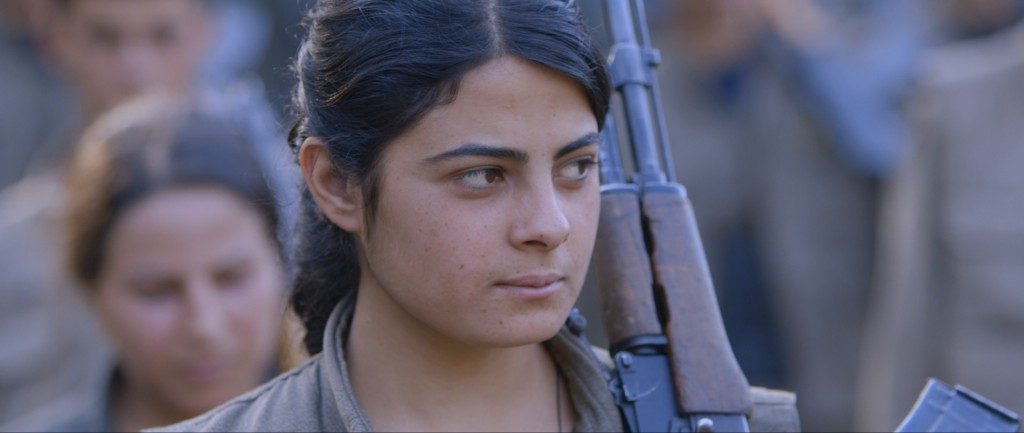Zaynê Akyol is an award-winning filmmaker of Kurdish origin who was born in Turkey and raised in Quebec. Akyol won the René Malo Chair/National Film Board of Canada award for most promising documentary filmmaker. In 2010, she followed up with her medium-length documentary, “Iki Bulut Arasinda” (“Under Two Skies”), which won the Jury and People’s Choice awards at the Festival Vidéastes Recherché-es, as well as the Vox award at the Rendez-vous du Cinéma Québécois Festival, before touring the international festival circuit. (Press materials)
“Gulîstan, Land of Roses” will premiere at the 2016 Hot Docs Film Festival on May 3.
W&H: Describe the film for us in your own words.
ZA: A group of young women stand at the forefront of the fight for freedom in the Middle East. They belong to the armed wing of the PKK, the Kurdistan Workers’ Party, which is also an active guerrilla movement. From their camp hidden away in the mountains, the women lead a nomadic life, undergoing ideological and practical training before being sent out to the front lines.
Their mission? Defend Kurdish territory in Iraq and Syria and defeat ISIS — the armed militants of the so-called Islamic State group.
Capturing their ritualized daily activities, as well as the emotional and intellectual bonds that unite them, “Gulîstan, Land of Roses” sheds light on the lives of these women who are collectively fighting for a revolutionary ideal advocating female empowerment. The film also gives them a powerful voice, and in return, many of them openly share their most intimate thoughts and dreams. Even as fighting against ISIS intensifies in the Middle East, these women bravely continue their battle against barbarism.
W&H: What drew you to this story?
ZA: I was born in Turkey, but I’m of Kurdish origin, and the Kurdish guerrillas used to come and visit us in my home village. The PKK fighters had been part of my environment from a very young age. Then, after immigrating to Canada, I met Gulîstan, who was 15 years older than me, but her story was similar to mine. We were from the same small village in Turkey and were both of Kurdish origin and the Alevi faith. Gulîstan was like my big sister; she was my role model. One day, she disappeared from my life and went to enlist in the PKK.
At the time, I didn’t really understand the significance of her act, but the more time passed, the more I sensed the gravity of it. That’s why at first I wanted to make a film about Gulîstan, who died in 2000, by retracing her journey and motives. However, just as I arrived in Iraqi Kurdistan, Daesh (Islamic State) began attacking the region. The subject of my film now had to be these PKK women guerillas. And I think that a part of Gulîstan is inevitably there. Gulîstan means “Land of Roses.”
W&H: What do you want people to think about when they are leaving the theater?
ZA: My initial purpose in making this film was to help make the Kurdish cause better known. There are 40 million Kurds and they are the largest group of people in the world without a country. I would like to raise people’s awareness about what is happening in Kurdistan, with Daesh, or within the four countries (Turkey, Iran, Iraq, Syria) in which they are located.
For 34 years, the PKK has been fighting against the injustice suffered by the Kurds, and yet it is classified as a terrorist organization by the European Union, the United States, Canada, and several other countries.
W&H: What was the biggest challenge in making the film?
ZA: The filming was not difficult for me. The greatest difficulty I encountered in making this film was having to wait for the funding to do it.
W&H: How did you get your film funded? Share some insights into how you got the film made.
ZA: The screenplay of my film won me the René-Malo Chair/National Film Board Award for most promising documentary filmmaker towards the end of my undergraduate studies. This award was part of the NFB’s ACIC program. After that, given the scope of the project, I managed to convince the NFB to let me enter the regular program. I’ve also received funding from SODEC and CALQ for screenwriting and production. In addition, I have a German producer whom I met in Iraqi Kurdistan while location scouting there, who funded a part of the project.
W&H: What’s the best and worst advice you’ve received?
ZA: The best advice I was given was, “Don’t be afraid to forge ahead — even if the project might appear ambitious and risky.”
I don’t take bad advice into consideration.
W&H: What advice do you have for other female directors?
ZA: [My advice is for them] to believe in their projects, listen to their intuition, and be honest with themselves.
W&H: Name your favorite woman-directed film and why.
ZA: Jihan El-Tahri is a very inspirational filmmaker. Although her cinematic style is far from mine, she has a political and committed approach that is very inspiring.







